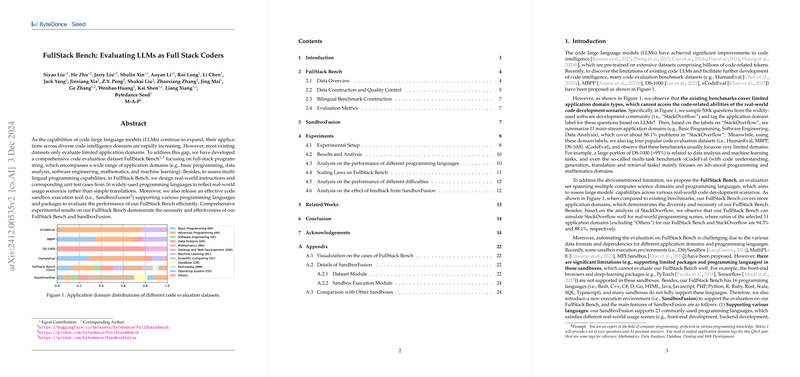Evaluation of LLMs as Full Stack Coders with FullStack Bench
The academic paper titled "FullStack Bench: Evaluating LLMs as Full Stack Coders" presents a sophisticated code evaluation benchmark dataset, named FullStack Bench, targeted at assessing the capabilities of LLMs in a wide range of real-world coding scenarios. Unlike many extant benchmarks, which often assess a restricted spectrum of programming tasks, FullStack Bench is distinctive in its coverage of a diverse array of domains, reflected in its name referencing "full-stack programming." This dataset incorporates 3,374 problems spanning key areas such as basic programming, data analysis, software engineering, mathematics, machine learning, as well as multilingual coding tasks across 16 widely-utilized programming languages.
Core Components of the Research
The authors identify a fundamental shortcoming in existing code benchmarks: limited domain diversity that does not adequately simulate the multifaceted nature of real-world programming environments. To mitigate this gap, FullStack Bench leverages a meticulously curated set of problems representing over 88% of challenges sampled from StackOverflow, thus capturing a robust sense of practical software development. Complementing the benchmark dataset, the paper also introduces the SandboxFusion execution tool, designed with extensive support for 23 programming languages and capable of efficiently processing diverse coding challenges.
Notable Findings and Results
Experimental findings within the paper underscore the pronounced differences between existing benchmarks and FullStack Bench. Importantly, empirical evidence reveals that models frequently perform well on simpler human-evaluated datasets but encounter substantial challenges with FullStack Bench's more diverse and complex problem sets. This differentiation is visually represented in comparative plots which illustrate that model performance on existing benchmarks such as HumanEval does not predict success on the enhanced FullStack Bench.
Implications and Future Directions
The development and implementation of FullStack Bench and SandboxFusion stand to significantly enhance the examination of LLMs in more comprehensive programming scenarios. On a theoretical level, this research suggests a reevaluation of success metrics for LLMs in coding contexts; current assessments may underemphasize key aspects of programming proficiency, particularly when judged purely on constrained, stereotypically simpler tasks. Practically, this dataset serves as a critical resource for developers looking to refine or benchmark their AI models against a broader spectrum of challenges indicative of a real-world coding environment.
Looking forward, the FullStack Bench presents paths for future research that could include expanding the dataset to incorporate additional programming languages and emergent technologies. Additionally, it establishes a paradigm for future evaluations, advocating for a paradigm shift toward more holistic and diversified code capability assessments of LLMs.
Overall, the paper effectively demonstrates the utility of FullStack Bench and SandboxFusion in evaluating the practical applicability of AI models in genuine and expanded coding contexts. This work undeniably contributes to a deeper understanding of the adaptive capabilities and limitations of LLMs within the diverse field of software development.
